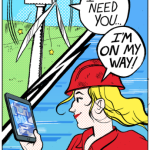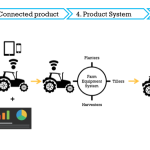
by NIMMI RANGASWAMY, SAURABH SRIVASTAVA, TEJASVIN SRINIVASAN & PRIYANKA SHARMA (Xerox Research Centre, Bengaluru, India)
Article 6 in the series Data, Design and Civics: Ethnographic Perspectives
How must we conjure up smart spaces?
‘Smart city’ has become an over-indulged urban metaphor, whipping up an apparition of dispersed, highly networked and interconnected socio-economic, infrastructural and communication nodes. The smart city narrative seems to dwell on the idea of cites as ‘receptacles for technology’—and qualitative transformations are brought about by the application of technologies. Even after decades of research to the contrary, we still tell ourselves stories about the inevitable march of technology and its deterministic effect on culture and behavior.
But aren’t cities also places that give birth to technologies? As researchers we are drawn to the miraculous nature of technology to sense, track and quantify not only human use of infrastructure but also the human ‘self’. We are working to...





